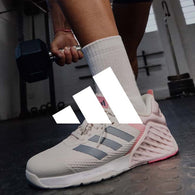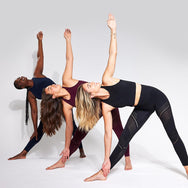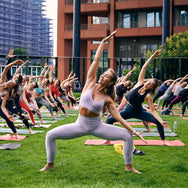Life was never the same for Steve after running the London Marathon in 2001, and something he says to first-time marathoners now is that the process of training for and completing a marathon is a game changing experience. As a run coach, Steve will help you identify things that might be holding you back, set goals with you, and treat you like an individual within a group environment. Read on to meet this week's NARC coach, Steve Hobbs.
QYour nickname (if you have one)
I answer to Steve, Hobbo, Hobo, Hobbsy, CoachHobbs, Hobbsdog and Stephen
QDid you have a ‘eureka’ moment where you became a runner?
I am old enough to remember watching the very first London Marathon, and was keen to run it one day, which I did in 2001. It was a life-changing experience. Something I say to first-time marathoners now is that life will never be quite the same once you've gone through the process of training for and then completing a marathon, especially London. It's a unique experience that stays with you forever, and is capable of changing your approach to life. After returning to London in 2002, I stopped running for a while to finish playing team sports. In 2007, my football playing days were over and I went to New York and by coincidence the NYC Marathon was on. Inspired, I vowed to run it the following year, and did so - reasonably well, and the running bug took hold....
QFavourite London run?
 There are loads of good runs in London - The Lea Valley canal, Regents canal, Greenwich park, the river obviously, but a trip North from Finsbury Park to Highgate Woods and Hampstead Heath is a beautiful, off-road, hilly workout.
There are loads of good runs in London - The Lea Valley canal, Regents canal, Greenwich park, the river obviously, but a trip North from Finsbury Park to Highgate Woods and Hampstead Heath is a beautiful, off-road, hilly workout.
QFavourite non-London run?
I enjoy San Francisco, there are some great running trails and amazing views there once you get out of the city.QFavourite way to recover post-run?
Some food, any food.QWhat do you think about if you hit the wall on a marathon?
In my coaching, I spend time working through how people will deal with the hard last 4-6 miles. Usually rational thought goes out of the window at this point, so I encourage people to draw upon emotions. I ask them to return to the reason why they're trying to complete the marathon in the first place. If its about achieving a certain time, that time is often important to them because of what other people might think - parents, partners, children, colleagues, running mates, Facebook friends - they all count. Typically, we want people to proud of us, we want people to notice. In some cases though, there is no time-based objective involved, simply completing the marathon is a goal in its own right, perhaps you're running for charity in the name of someone close to you - thinking of them can drive you on. And finally, there is you. I encourage people to remember that they've worked hard for several months to get to this point and now they *just* need to be brave and not give it away in the last hour of effort. In all cases, the thought process is emotional, and it's these emotions that we can call upon when the marathon gets tough, as it always does, to everyone.QIn three words, what kind of coach are you?
Calm, empathetic, loyal
QWhat can people expect when they go for a run with you?
To be treated as an individual within a group environment.
Ready to run? Steve is leading us this Wednesday (June 15) for an all-levels NARC run at 6:30 pm. Meet at The Sports Edit (172 Fulham Road SW10 9PR), where you can lock up your stuff while we run it out. RSVP here or just show up.






























































